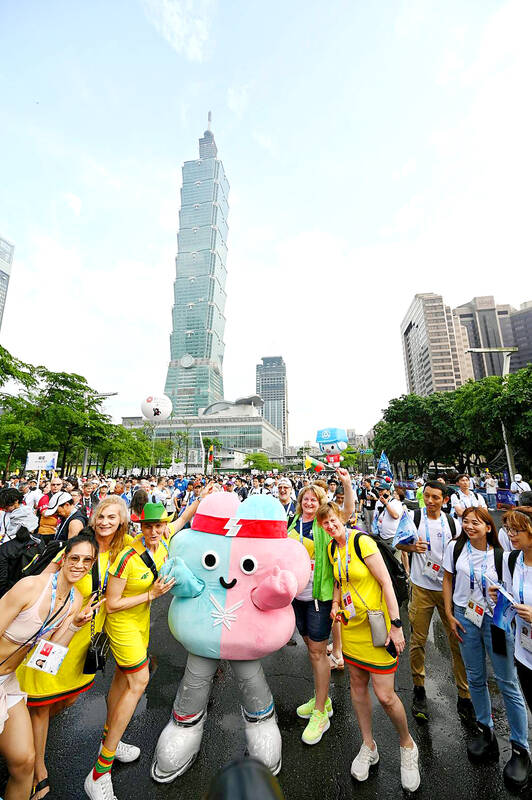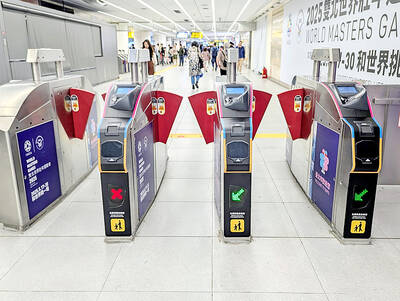The Executive Yuan yesterday approved draft amendments to the Sports Industry Development Act (運動產業發展條例) proposed by the Ministry of Education that would allow the National Development Fund to invest in the sports industry.
The amendments would also reward corporations sponsoring professional and non-professional sports events or key international events by allowing them to list up to 175 percent of the donated amount as tax deductible, up from 150 percent.
All the supplementary regulations and measures should be in place when the Ministry of Sports begins operations on Sept. 9, Executive Yuan spokesperson Michelle Lee (李慧芝) quoted Premier Cho Jung-tai (卓榮泰) as saying.

Photo: Fang Pin-chao, Taipei Times
“The purpose of the amendments to the act is to establish ways to invest in the sports industry, including introducing incentives for the private sector to fund the nation’s sports development. They stipulate that the National Development Fund should designate a fixed portion of the fund to invest in the sports industry to demonstrate the nation’s determination to support the sports industry,” Lee said.
With the funding from the National Development Fund and the private sector, the government would identify targets for investment and expand its interface with the sports industry, she said.
The amendments define the types of sports events that corporations can sponsor, including events among professional sports clubs, games organized by the government or state-run corporations and community sports events.
Businesses can list the donations they make to fund sport events as tax deductibles if the events are certified by the government.
The amendments simultaneously extend the duration for eligible donations, allowing enterprises to deduct their donations made to non-professional sports and key sports event organizers from their taxable income within 10 years, up from five years.

A magnitude 6.4 earthquake struck off the coast of Hualien County in eastern Taiwan at 7pm yesterday, the Central Weather Administration (CWA) said. The epicenter of the temblor was at sea, about 69.9km south of Hualien County Hall, at a depth of 30.9km, it said. There were no immediate reports of damage resulting from the quake. The earthquake’s intensity, which gauges the actual effect of a temblor, was highest in Taitung County’s Changbin Township (長濱), where it measured 5 on Taiwan’s seven-tier intensity scale. The quake also measured an intensity of 4 in Hualien, Nantou, Chiayi, Yunlin, Changhua and Miaoli counties, as well as

Credit departments of farmers’ and fishers’ associations blocked a total of more than NT$180 million (US$6.01 million) from being lost to scams last year, National Police Agency (NPA) data showed. The Agricultural Finance Agency (AFA) said last week that staff of farmers’ and fishers’ associations’ credit departments are required to implement fraud prevention measures when they serve clients at the counter. They would ask clients about personal financial management activities whenever they suspect there might be a fraud situation, and would immediately report the incident to local authorities, which would send police officers to the site to help, it said. NPA data showed

ENERGY RESILIENCE: Although Alaska is open for investments, Taiwan is sourcing its gas from the Middle East, and the sea routes carry risks, Ho Cheng-hui said US government officials’ high-profile reception of a Taiwanese representative at the Alaska Sustainable Energy Conference indicated the emergence of an Indo-Pacific energy resilience alliance, an academic said. Presidential Office Secretary-General Pan Men-an (潘孟安) attended the conference in Alaska on Thursday last week at the invitation of the US government. Pan visited oil and gas facilities with senior US officials, including US Secretary of the Interior Doug Burgum, US Secretary of Energy Chris Wright, Alaska Governor Mike Dunleavy and US Senator Daniel Sullivan. Pan attending the conference on behalf of President William Lai (賴清德) shows a significant elevation in diplomatic representation,

The Taipei MRT is to begin accepting mobile payment services in the fall, Taipei Rapid Transit Corp said on Saturday. When the company finishes the installation of new payment units at ticketing gates in October, MRT passengers can use credit cards, Apple Pay, Google Pay and Samsung Pay, the operator said. In addition, the MRT would also provide QR payment codes — which would be compatible with Line Pay, Jkopay, iPass Money, PXPay Plus, EasyWallet, iCash Pay, Taiwan Pay and Taishin Pay — to access the railway system. Currently, passengers can access the Taipei MRT by buying a single-journey token or using EasyCard,